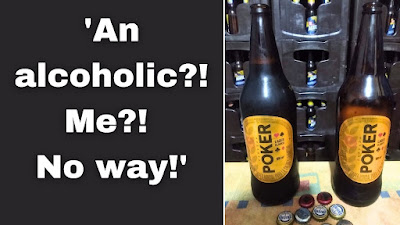[For an audio/vlog version of this story, click here.]
A barrio acquaintance, one who is not only very fond of marijuana and the hip psychedelic tusi but has also been a petty peddler of same, called me an alcoholic the other day.
A case of, an outside observer might say, one addict knowing another.
 |
| One man's alcoholic is another's merely mild drinker, right? |
Yet, as an Irishman who likes the occasional beer that often leads to a questioning of my relationship with alcohol, her remark did end up bugging me a little.
'Am I an alcoholic?'
Habit addict
To answer that, we must define what an alcoholic is.One dictionary definition describes an alcoholic as 'a person addicted to intoxicating drinks.' Another definition is 'somebody who drinks alcohol to excess habitually.'
Those definitions, however, in using words such as 'addicted', 'excess' and 'habitually', are open to much interpretation.
Some commentators and scholars on the subject dismiss the concept of addiction outright. They see it as a mere cover for one's failure to take responsibility.
According to this school of thought, it's not an innate, incurable addiction that's at play but rather a very fixable fixation. It's a harmful habit that can be replaced with a more beneficial — or at least less-bad — one. What's lacking is willpower, as well as any real desire to change in many instances.
'That four-day booze-free stint coincided with an annoying head cold. Was my body telling me something? A case of a beer a day keeps colds at bay?'In other words, people know they're doing something that's not good for their overall well-being but they do it anyway. (Of course, few of us live vice-free — even exercise can become a problem if one overdoes it regularly. Some vices, though, are more damaging than others.)
Mild imbiber
Returning to our definitions of alcoholic, it's easier, at least officially, to find consensus for what excess and habitually mean.In Ireland, a standard drink is defined as one which contains 10 grams of pure alcohol. The advice is that a man should drink no more than 17 such servings a week, a woman no more than 11.
If one drinks alcohol more days in a week than not, few would argue that this is habitual.
On that last one, despite publishing a few months ago a hopeful post, Abandoning the beer standard, I've been quite the habitual drinker of late.
The longest run I've had without a beer in 2023 has been four days, and that was on one occasion only. Frustratingly, that four-day booze-free stint coincided with an annoying head cold. Was my body telling me something? A case of a beer a day keeps colds at bay?
Plenty of downtime this year and not wanting to be in my shared accommodation for too long at any one time are two big reasons for this regular revelling, tame as it normally is.
What's more, as a pastime, sipping on a Barrio Santandercito tienda beer is a fairly economical activity compared to some other pursuits one could get up to in Bogotá.
As alluded to, in terms of excess, my consumption levels each time I drink are nothing like they were in the past.
Where previously when I would go at it, as we Irish say, I'd have at least four litres of Poker beer or the equivalent, these days I'm usually looking for the exit door after two or at most three. (Do note, Poker's alcohol by volume [ABV] is four per cent.)
So my binge-drinking days do appear to be largely behind me. Compared to other regular drinkers, I think it's fair to put me in the mild category. I'm certainly no Brendan Behan — no sniggering — who described himself as 'a drinker with a writing problem.' Some might say writing is my main problem and I should give that up!
Constant craving
Whatever the case, there is another factor to be considered: cravings.This ties in with addiction, whether one believes addiction to be a genuine disease or not.
I surmise that people who I consider to be alcoholics crave alcohol, it's constantly in their thoughts. When they get up in the morning, if a beer or whatever was put in front of them, they'd have no issue downing it. What usually prevents such types from doing so is a job commitment or suchlike.
I, on the other hand, rarely if ever desire an alcoholic drink first thing. For me, imbibing has a time and a place — the time is normally late in the evening, the place is a tienda/public house, certainly not my own dwelling.
And as I've already pointed out, I'm more than content to retire to my bed after a couple of litres. Where perhaps in my earlier drinking days I suffered from fomo, fear of missing out, these days I'm more in the jomo, joy of missing out, camp.
So, yes, I do like beer and I may regularly drink more units of alcohol per week than most health experts recommend.
Nonetheless, life in my late 30s doesn't revolve around the next alcohol-fuelled session like it did to some extent in my 20s and early 30s.
Of course, how I feel and what I believe is one thing. How others view me is another. Perception is reality in this regard. Yet, it's only the perceptions and opinions of certain people in my life that I should really value. Others are best ignored.
__________________________________________________________
Listen to The Corrigan Cast podcast here.
Facebook: Wrong Way Corrigan — The Blog & IQuiz "The Bogotá Pub Quiz".
No comments:
Post a Comment